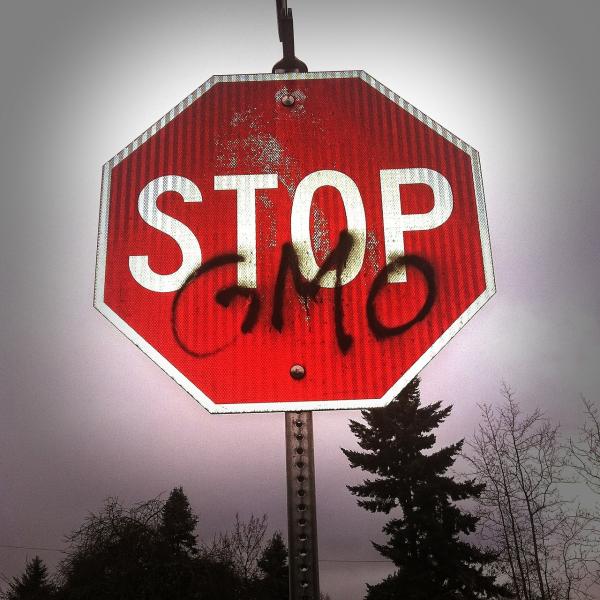A few things can be said with certainty about “non-GMO” food labels. There's no scientific justification for their existence, since products made from genetically engineered (GE) ingredients do not pose a risk to consumers. Such labeling schemes are therefore nothing more than marketing gimmicks, and they can backfire on the companies that employ them.
Case in point: a class-action lawsuit recently filed against baby food maker Gerber alleged that the company is “cheating” its customers by selling non-GMO products that, in fact, contain GE ingredients or are derived from GE crops or animals that eat them. The law firm Keller Heckmen summed up the case in a recent blog post:
The lawsuit alleges that Non GMO and similar claims (e.g., GMO free) are understood by consumers in a manner consistent with the definitions set forth by the Non GMO Project, a non-profit organization that offers a “Non GMO Project” certification which requires that the certified foods contain no genetically modified processes or inputs (e.g., animal food products derived from animals fed genetically engineered feed).
Plaintiff credits the widespread use of the Non GMO Project label and the educational outreach efforts of the organization with aligning consumer expectations with the Non GMO Project Standard.
As we'll see, the allegations are scientifically dubious, but they illustrate our point: companies that ignore science for the sake of marketing can end up facing unnecessary trouble of their own making.
The plaintiff's complaint laid out the following justifications for the lawsuit:
Many consumers want to avoid GMOs for a variety of reasons, including, but not limited to, the following: (1) health risks associated with ingesting foods derived from genetically modified (“GM”) crops; (2) concerns of the ingestion of pesticides and other toxins; (3) interest in promoting sustainable living and local farming; and (4) negative environmental effects associated with growing GM crops.
The plaintiff offered no evidence in support of these claims. Citing the Center For Food Safety, the complaint pointed to “wide-ranging controversies” (p 5) surrounding the health risks and environmental effects of GE crops. [1] But “controversy” doesn't have any measurable toxicity, nor can it hinder sustainable living or local farming. The fact of the matter, demonstrated time and again, is that GE crops do not pose an appreciable risk to humans or the environment. Why the legal system would even entertain “concerns” to the contrary is baffling.
Non-GMO foods made with GMOs
The plaintiff also asserted that
“Plaintiff and consumers reasonably understand Defendant’s [Gerber's] Non-GMO Claims to mean that Defendant’s Products are 100% free of ingredients derived from GM crops or food sources, genetically engineered in a laboratory setting through the use of biotechnologies, or sourced from animals that have been raised on GMO feed.” (p 2)
This makes even less sense than the made-up safety and environmental concerns; the Non-GMO Project itself has noted that some of its verified products contain genetically modified ingredients, up to five percent of the finished product in certain cases. The project has also acknowledged that “not all” GE ingredients “are detectable by current tests.”
The only way around this is to require food companies to sign “legally-binding affidavits for non-testable high-risk crops, inputs, and ingredients attesting that they have not been genetically modified.” That's better than nothing, but it's far short of a rock-solid guarantee that consumers are buying truly GMO-free products.
So, if some Non-GMO Project-verified products contain a certain percentage of GE ingredients, how can Gerber be held liable for mislabeling its non-GMO products? The lawyers can sort that out in court. But as a matter of fact, there isn't a logical answer to the question. Incidentally, at least some of Gerber's products carry the project's well-known butterfly logo. Presumably, the plaintiff is fine with those products containing small amounts of GE ingredients, just not the products that carry Gerber's own non-GMO label.
Told you so
In March 2019, the Food and Drug Administration (FDA) issued a guidance document encouraging food companies to avoid the use of terms like “GMO free,” “GE free,” “does not contain GMOs” and “non-GMO.” The agency's reasoning?
"The term ‘free’ conveys zero or total absence….FDA recommends that manufacturers not use food labeling claims that indicate that a food is ‘free’ of ingredients derived through the use of biotechnology …"
In other words, even the plaintiff's standard for accurate labeling, Non-GMO Project verification, can be misleading. Indeed this is why the Information Technology & Innovation Foundation (ITIF) petitioned the FDA to ban the use of "Non-GMO" on labels in 2018. “They are exactly the sort of deceptive and misleading labels Congress was intent on prohibiting,” Val Giddings, a geneticist and senior fellow at the ITIF, told the Genetic Literacy Project in 2019.
The plaintiff acknowledged the FDA's conclusion but apparently didn't realize the agency's guidance applies to the Non-GMO Project as well as Gerber; "Non-GMO" is literally in the project's name. All this aside, the more interesting point is that Gerber may have avoided a potentially very expensive lawsuit had it heeded the FDA's advice and avoided “non-GMO” and similar language altogether.
Earlier this week, I opened a container of Gerber's mashed green beans for my son. I noticed the “Non-GMO Project Verified” logo and shook my head with disapproval. I know I paid more for the container because that stupid butterfly was printed on the packaging. [2] But what goes around comes around. Gerber may find out real soon how frustrating it is to spend lots of money and receive nothing in return.
[1] CFS is an activist group run by lawyers who sustain themselves by filing frivolous lawsuits and bragging to their donors about it.
[2] There are no “GMO” green beans in commercial production. The FDA has also said that labeling any product “non-GMO” when it has no genetically engineered counterpart is misleading.




